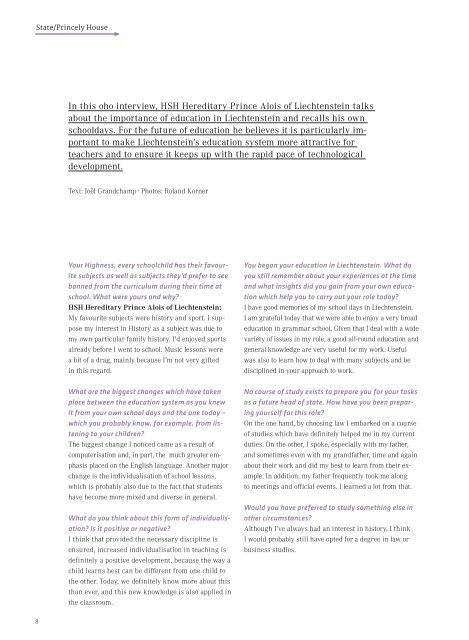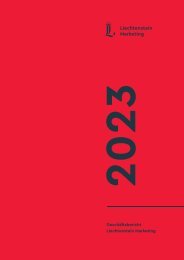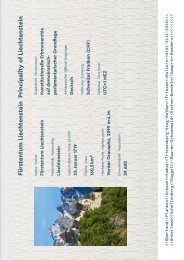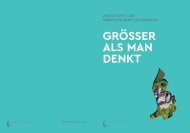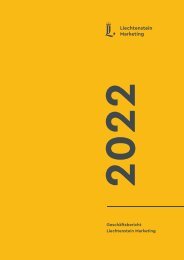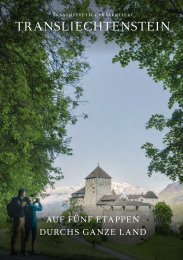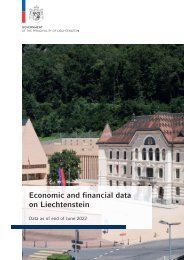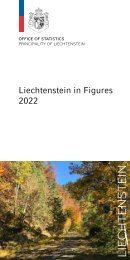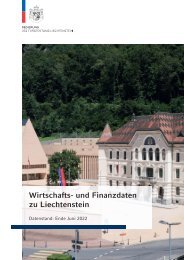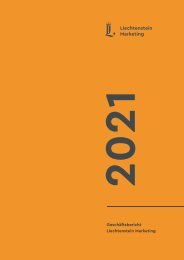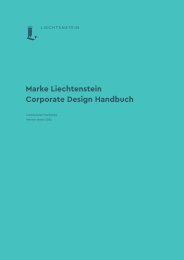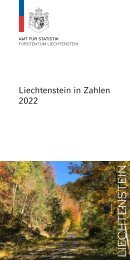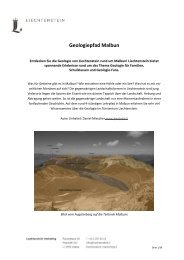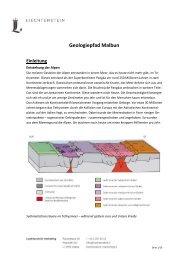oho #4 - The magazine of the Principality of Liechtenstein
The Liechtenstein magazine takes you onto a journey through the country. Find out more about the state, the Princely House, the nature, the culture, the economy and more.
The Liechtenstein magazine takes you onto a journey through the country. Find out more about the state, the Princely House, the nature, the culture, the economy and more.
Create successful ePaper yourself
Turn your PDF publications into a flip-book with our unique Google optimized e-Paper software.
State/Princely House<br />
In this <strong>oho</strong> interview, HSH Hereditary Prince Alois <strong>of</strong> <strong>Liechtenstein</strong> talks<br />
about <strong>the</strong> importance <strong>of</strong> education in <strong>Liechtenstein</strong> and recalls his own<br />
schooldays. For <strong>the</strong> future <strong>of</strong> education he believes it is particularly important<br />
to make <strong>Liechtenstein</strong>’s education system more attractive for<br />
teachers and to ensure it keeps up with <strong>the</strong> rapid pace <strong>of</strong> technological<br />
development.<br />
Text: Joël Grandchamp · Photos: Roland Korner<br />
Your Highness, every schoolchild has <strong>the</strong>ir favourite<br />
subjects as well as subjects <strong>the</strong>y’d prefer to see<br />
banned from <strong>the</strong> curriculum during <strong>the</strong>ir time at<br />
school. What were yours and why?<br />
HSH Hereditary Prince Alois <strong>of</strong> <strong>Liechtenstein</strong>:<br />
My favourite subjects were history and sport. I suppose<br />
my interest in History as a subject was due to<br />
my own particular family history. I'd enjoyed sports<br />
already before I went to school. Music lessons were<br />
a bit <strong>of</strong> a drag, mainly because I’m not very gifted<br />
in this regard.<br />
What are <strong>the</strong> biggest changes which have taken<br />
place between <strong>the</strong> education system as you knew<br />
it from your own school days and <strong>the</strong> one today –<br />
which you probably know, for example, from listening<br />
to your children?<br />
<strong>The</strong> biggest change I noticed came as a result <strong>of</strong><br />
computerisation and, in part, <strong>the</strong> much greater emphasis<br />
placed on <strong>the</strong> English language. Ano<strong>the</strong>r major<br />
change is <strong>the</strong> individualisation <strong>of</strong> school lessons,<br />
which is probably also due to <strong>the</strong> fact that students<br />
have become more mixed and diverse in general.<br />
What do you think about this form <strong>of</strong> individualisation?<br />
Is it positive or negative?<br />
I think that provided <strong>the</strong> necessary discipline is<br />
ensured, increased individualisation in teaching is<br />
definitely a positive development, because <strong>the</strong> way a<br />
child learns best can be different from one child to<br />
<strong>the</strong> o<strong>the</strong>r. Today, we definitely know more about this<br />
than ever, and this new knowledge is also applied in<br />
<strong>the</strong> classroom.<br />
You began your education in <strong>Liechtenstein</strong>. What do<br />
you still remember about your experiences at <strong>the</strong> time<br />
and what insights did you gain from your own education<br />
which help you to carry out your role today?<br />
I have good memories <strong>of</strong> my school days in <strong>Liechtenstein</strong>.<br />
I am grateful today that we were able to enjoy a very broad<br />
education in grammar school. Given that I deal with a wide<br />
variety <strong>of</strong> issues in my role, a good all-round education and<br />
general knowledge are very useful for my work. Useful<br />
was also to learn how to deal with many subjects and be<br />
disciplined in your approach to work.<br />
No course <strong>of</strong> study exists to prepare you for your tasks<br />
as a future head <strong>of</strong> state. How have you been preparing<br />
yourself for this role?<br />
On <strong>the</strong> one hand, by choosing law I embarked on a course<br />
<strong>of</strong> studies which have definitely helped me in my current<br />
duties. On <strong>the</strong> o<strong>the</strong>r, I spoke, especially with my fa<strong>the</strong>r,<br />
and sometimes even with my grandfa<strong>the</strong>r, time and again<br />
about <strong>the</strong>ir work and did my best to learn from <strong>the</strong>ir example.<br />
In addition, my fa<strong>the</strong>r frequently took me along<br />
to meetings and <strong>of</strong>ficial events. I learned a lot from that.<br />
Would you have preferred to study something else in<br />
o<strong>the</strong>r circumstances?<br />
Although I’ve always had an interest in history, I think<br />
I would probably still have opted for a degree in law or<br />
business studies.<br />
8


